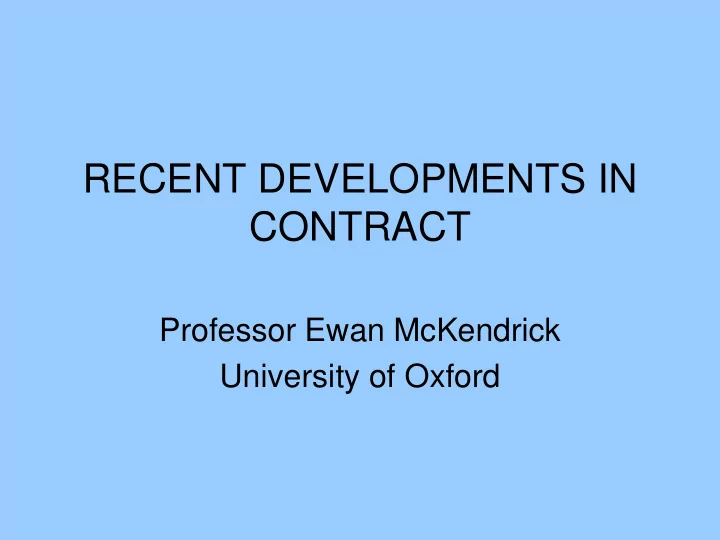

RECENT DEVELOPMENTS IN CONTRACT Professor Ewan McKendrick University of Oxford
OFFER AND ACCEPTANCE • A standing offer which if acted upon before it lapsed or was validly withdrawn would result in a binding contract • No requirement that a party indicate its acceptance of each and very term • Assent must be final and unqualified • The ‘interim contract’ into which the parties had entered and the final contract into which they hoped to enter
TRIGGER EVENT NOT ESSENTIAL • Failure expressly to agree trigger date not fatal • Reluctance to conclude no contract given intention of parties • Payment would become due on completion and made from the proceeds of sale • A term can be implied into what would otherwise be an incomplete agreement if it is necessary to do so in order to make the contract work as intended by the parties.
INTERPRETATION I • Objective meaning of the language which the parties have chosen • The matrix of fact • The contract as a whole • The nature, formality and quality of drafting of the contract • Two possible meanings • The role of business common sense
INTERPRETATION II • A unitary exercise • An iterative approach • A balancing exercise • General principles often agreed • Unambiguous language – the courts must give effect to it • Textual analysis does not require a literal approach
INTERPRETATION III • A failure to think through the consequences • Punctuation may be misunderstood, erroneously used or overlooked • Standard form contracts: the ISDA Master Agreement • Limited significance of contra proferentem rule
INTERPRETATION IV • Long term or relational contracts – PFI contracts • The role of prior authority • The argument from redundancy • The significance of deleted terms • Force majeure clauses – the need for clear words
No Oral Modification Clauses • They are binding and effective • NOM as ‘dangerous’ boilerplate • The role of estoppel • Analogy with entire agreement clauses and subject to contract clauses • Consideration and part payment of a debt
IMPLIED TERMS • Test is necessity rather than reasonableness • Implication more difficult in case of a written contract of some length which has been negotiated with the benefit of legal advice • Not appropriate to use hindsight • Fairness and reasonableness not enough • Starting point is express terms of the contract • Entire agreement clause does not rule out implication of terms as a matter of fact
No reliance clauses • Caught by section 3 of the Misrepresentation Act 1967 • Similar conclusion for ‘basis’ clauses • Contractual estoppel • Form or substance? • Drafting devices of limited utility • Focus on the reasonableness of the clause
FRUSTRATION • UK withdrawal from EU would not frustrate lease • Narrow limits of the doctrine of frustration affirmed • No supervening illegality • No frustration of common purpose
DAMAGES • General rule – compensation for loss • Law tolerant of imprecision in relation to proof of loss • Negotiating damages – an exception • Interference with property or when specific performance or injunction refused • When is a contract right a valuable asset? • Account of profits truly exceptional
EXCLUSION CLAUSES • Onerous or unusual term? • Reasonable notice given • Common rules on incorporation unaffected by UCTA • Reasonableness: (i) equality of bargaining power and party autonomy, (ii) availability of insurance and (iii) relatively low value contract and high potential liability • The importance of the individual case
Recommend
More recommend